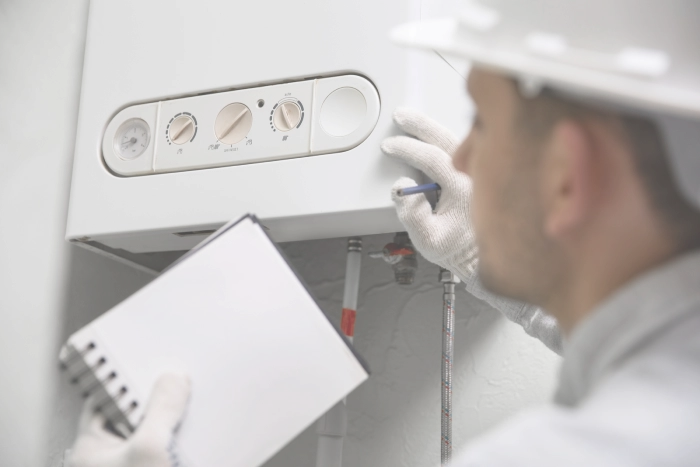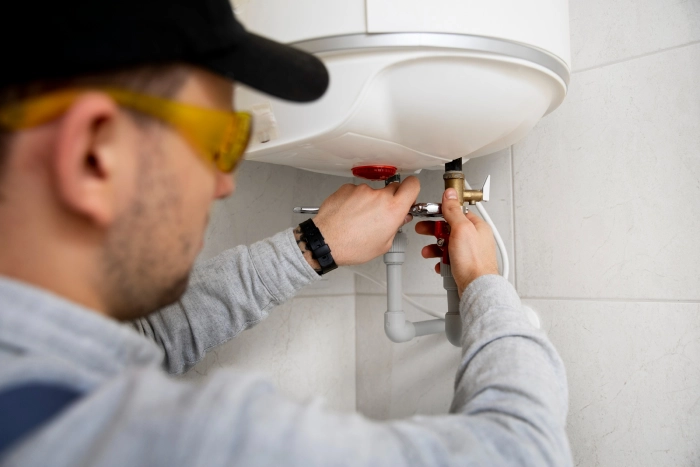
Water heaters are essential appliances in every household, supplying hot water for showers, dishwashing, and laundry. However, like any other appliance, they can encounter problems over time. Dealing with water heater problems can be bothersome, but knowing how to address common issues can save you time and inconvenience. In this blog, we’ll discuss common water heater problems and provide step-by-step guidance on addressing them effectively.
Common Water Heater Problems
Common water heater problems can range from minor inconveniences to serious issues that require professional attention. Here are some of the most typical water heater problems encountered with water heaters:
No Hot Water
One of the most common issues is when the water heater fails to produce hot water. This could be due to various reasons, such as a faulty heating element, a malfunctioning thermostat, or a power supply problem.
Inadequate Hot Water
If the water heater is producing hot water but not enough for your needs, sediment buildup in the tank could be the culprit. This buildup reduces the tank’s capacity, resulting in insufficient hot water.
Strange Noises
The water heater often emits loud banging, popping, or rumbling noises, which typically result from the buildup of sediment or mineral deposits at the tank’s bottom. This can affect the heater’s efficiency and lifespan.
Leaking Tank
A leaking water heater is a serious problem that requires immediate attention. Leaks can occur due to corrosion, a loose or damaged valve, or a crack in the tank. Ignoring a leaking tank can lead to water damage and mold growth in your home.
Discolored Water
Rusty or discolored water coming from the taps can indicate corrosion inside the water heater tank. This could be caused by a deteriorating anode rod or sediment buildup, which can compromise water quality and the heater’s performance.
Step-by-Step Guide to Fixing Your Water Heater
Fixing water heater problems can vary greatly depending on the issue you’re facing and the type of water heater you have (gas or electric). Here’s a general step-by-step guide to address some common issues with electric water heaters:
1. Safety First
Before starting any work, ensure safety measures are in place. This includes turning off the power to electric water heaters at the breaker box and shutting off the gas supply to gas water heaters. Be sure to wear gloves and goggles for protection, and be cautious of hot water and electrical hazards.
2. Identify the Problem
Take time to thoroughly assess the issue with your water heater. Check for signs of leaks, listen for unusual noises, and test the temperature of the water. Understanding water heater problems will help you determine the appropriate course of action.
3. Check the Power Supply
For electric water heaters, verify that power is reaching the unit by checking the circuit breaker. If it has tripped, reset it and monitor for any recurring issues. If the problem persists, there may be a wiring problem that requires professional assistance.
4. Inspect the Heating Elements
Heating elements are critical components responsible for heating the water. Use a multimeter to test their continuity and ensure they are functioning correctly. If a heating element is malfunctioning, it will need to be replaced with a compatible part.
5. Flush the Tank
Sediment buildup can accumulate at the tank’s base, reducing efficiency and potentially causing damage. To flush the tank, connect a garden hose to the drain valve and let the water run until it appears clear. This task should be performed carefully to avoid injury, and professional assistance may be required if you are unfamiliar with the process.
6. Check the Thermostat
The thermostat regulates the water heater’s temperature. Test its continuity with a multimeter and verify that it’s functioning correctly. If the thermostat is faulty, replace it with a compatible replacement to ensure accurate temperature control.
7. Inspect and Replace Anode Rod (if applicable)
Anode rods are sacrificial components that help prevent corrosion inside the tank. Over time, they may rust and require replacement. Draining the tank and accessing the anode rod can be challenging, so it’s advisable to hire a professional plumber for this task.
8. Address Leaks
Leaks can cause water damage and indicate underlying issues with the water heater. Inspect the tank, connections, and valves for signs of leakage. Tighten loose connections and replace damaged parts promptly. If unable to locate or fix the leak, seek professional assistance to prevent further damage.
9. Reassemble and Test
After completing repairs, reassemble the water heater components carefully. Restore power to the unit and observe its operation. Check for leaks and verify that hot water is being produced consistently. If any issues persist, consult a professional for further diagnosis and repair.
10. Hire a Professional
If you’re unsure about diagnosing or fixing water heater problems yourself, or if the issue is complex or potentially hazardous, consider hiring a professional plumber or HVAC technician. Look for a licensed and experienced professional with expertise in water heater repair. They have the necessary skills, knowledge, and tools to safely and effectively diagnose and resolve water heater problems.
Hiring a professional guarantees the job is completed accurately, thereby reducing the risk of further damage or safety hazards. Additionally, professionals can provide valuable guidance on maintenance practices to extend the lifespan of your water heater and optimize its performance.
11. Schedule Maintenance
Regular maintenance is essential for extending your water heater’s lifespan. Consider scheduling annual inspections with a qualified plumber to flush the tank, inspect components, and address any potential issues before they escalate. This proactive strategy can help prevent costly repairs and ensure efficient operation.
FAQs

How much does a water heater repair cost?
The cost of water heater repairs typically ranges from $185 to $850 on average. However, the final cost can vary based on factors like the type of repair needed and how severe the problem is. It’s best to get an estimate from a plumber to know the exact cost of your situation.
Where is the best place to put a water heater?
The best location for a water heater is typically in a designated utility area, such as a garage, basement, or utility closet. It should be situated on a stable, level surface with proper ventilation and sufficient clearance around the unit for maintenance and safety. Avoid placing the water heater in living spaces or high-traffic areas to minimize the risk of water heater problems or accidental contact.
Can I leave the water heater on overnight?
It is generally safe to leave the water heater on overnight, as it is designed to maintain a constant temperature and supply hot water as needed. However, if you’re concerned about energy consumption or safety, you can consider using a timer to schedule the water heater to turn off during periods of low usage, such as late at night. This can help reduce energy costs while ensuring hot water is available when needed during peak usage times.
Conclusion
Water heater problems can disrupt daily routines and cause inconvenience, but with the right knowledge and approach, many issues can be addressed effectively. Following a step-by-step guide to fixing water heater problems can help restore the functionality of the water heater. Additionally, hiring a professional plumber or HVAC technician for complex issues or, if unsure about repairs, is advisable to ensure safety and proper resolution.
Are you struggling with water heater problems? Your search for reliable solutions ends here with True Plumbing. Our seasoned plumbers excel in identifying and resolving an array of water heater issues. Get in touch with us today to learn more about how we can help.

